2020年春人教新目标英语八年级下册unit 9 Section A 3a - Section B-
人教新目标八年级英语下册第九单元(SectionA)

新目标版英语八年级下册Unit 9 Have you ever been to a museum?(Section A)一、根据句意及首字母提示完成单词1、根据句意及首字母提示完成单词(1)I hope that they will have a w________ time in the amusement park.(2)Have you ever b________ to a museum?(3)Most people of Taiwan island came from Guangdong P________.(4)Then the performers give us a wonderful p________.(5)The house i________ is not particularly to my mind, but I like its environment.二、用括号内所给动词的适当形式填空2、用括号内所给动词的适当形式填空(1)I ________ (study) English at this school for three years.(2)Yao Ming ________ (go) to America three months ago.(3)I need ________ (improve) my spoken English.初中英语- 2 - (4)Do you have any problem ________ (get) to the top of the hill?(5)To be ________ (honesty), it was one of the best novels that I have ever read.(6)It's fun ________ (learn) another language.(7)Next month Harry ________ (visit) his grandparents with his parents.(8)—Where is Mr. Wang?—He ________ (go) to the library. He wants to borrow some library books.(9)At first she ________ (think) about going camping, but later she changed her mind.(10)How long have you been ________ (wait) here?三、根据句意及汉语提示完成句子3、根据句意及汉语提示完成句子(1)There are so many different kinds of ________(坐便器)in the museum.(2)I make my dream come true by chance this time, and it's really ________(难以置信的).(3)With the teacher's help, he has made great ________ (进步) in English.(4)They tried their best to make their work ________(完美的).(5)Most of the ________(德国人)speak German.初中英语- 3 - 四、用所给词的适当形式填空4、用所给词的适当形式填空(1)This is a difficult ________ (society) problem to solve.(2)It's a (an) ________ (usual) experience, and few people have chances to do it.(3)Would you like ________ (collect) shells with me?(4)He was moving ________ (rapid) around the room.(5)We ________ (learn) English last night.五、单选题5、Jessica's parents always encourage her __________ out her opinions.A 、speakB 、speakingC 、to speakD 、will speak6、It is our hope that we can live in a __________ world and say goodbye to wars for ever.初中英语- 4 - A 、similarB 、peacefulC 、familiarD 、natural7、Liu Ying is good at singing. She sings __________ the famous singer, CoCo. A 、as well asB 、as good asC 、as better asD 、as the best as8、—Will you please go to see the movie with me?—No, I won't. I __________ it already.A 、sawB 、have seenC 、seeD 、will see初中英语- 5 -9、—This is a useful dictionary, I think.—So it is, and it's __________ unusual one.A 、theB 、anC 、aD 、不填10、—Which do you prefer, rice or noodles?—_________, thanks. I am not hungry. I only need some water. A 、NeitherB 、EitherC 、BothD 、All11、—Have you got any books on English grammar? I want to borrow __________. —Yes, here you are. But you must return it by Friday.初中英语- 6 - A 、oneB 、itC 、someD 、that12、My host tried to cook __________ for me when I studied in New Zealand.. A 、different somethingB 、different anythingC 、something differentD 、anything different13、Miss Lin __________ a lot of work for the poor area since 2010. A 、doesB 、didC 、has doneD 、will do14、Anna is going on a tour of Xi'an, and she wants to __________ Chinese history.初中英语- 7 - A 、dream ofB 、learn aboutC 、look throughD 、pass on15、—Have you ever read English novels?—__________.A 、Yes, I didB 、Yes, I haveC 、No, I haveD 、No, I don't16、When I walked past the park, I saw some old people __________ Chinese Taiji.A 、doesB 、didC 、doingD 、are doing初中英语- 8 - 17、—I have never been to European countries. What about you? —__________.A 、I tooB 、Me tooC 、I eitherD 、Me neither18、—Have you __________ been to Xiamen?—No, __________.A 、ever, neverB 、never; everC 、ever, everD 、never; never19、— I feel stressed from time to time. Could you give me some advice? —__________ sharing your worries with your parents?初中英语- 9 - A 、Why don't youB 、How aboutC 、Why notD 、Would you like20、—Hello! Is that Mr. Jiang?—No, he __________ Guiyang. He will be back in more than two weeks.A 、goesB 、wentC 、has gone toD 、has been to21、It's a fine day today. How about __________?A 、go campingB 、go to camp初中英语- 10 - C 、going campingD 、to go to camp22、When you move somewhere new, the first thing is to find a place __________. A 、to liveB 、living inC 、to live inD 、living23、—How long have you __________ here?—For two days. I __________ here the day before yesterday. A 、been; cameB 、come, cameC 、came; cameD 、come, was24、—__________ you __________ in this school for more than ten years? —Yes, I __________ here in 2002.A、Did; come, cameB、Have; been; cameC、Did; come; have beenD、Have; come; came六、从方框中选择合适的词(组),并用其适当形式完成句子25、从方框中选择合适的词(组),并用其适当形式完成句子(1)I have a great sports ________.(2)I have been ________ English for ten years.(3)The story ________ is good. But he didn't tell it well.(4)—________ you ever ________ to an amusement park? —Yes, I have.(5)They ________ a tent by the fire.七、语法专练26、语法专练(1) They have ever been to an English-speaking country. (改为一般疑问句) ________ they ever to________ an English-speaking country?(2)Have your parents read the book twice? (作肯定回答和否定回答)肯定回答:________否定回答:________八、口语交际27、重新排列以下句子,组成一个完整的对话。
初中英语人教版八年级下册Unit9 SectionA(3a--3c)

人教版新目标初中八年级英语下册Unit9 Have you ever been to a museum?Section A(3a-3c)教学设计梅州市大埔县华侨第二中学刘俊波一、教材分析本节课的教学内容是人教版新目标八年级英语下册第9单元的第二课时,即Section A(3a-3c)。
本单元围绕谈论好玩的地方开展多种教学活动,学会运用Have you ever been to …?这个句型来询问别人的经历,谈论曾经去过的地方。
其语法项目主要是学习现在完成时态的用法。
本节课是一堂阅读课,文章通过三个学生的分别叙述,呈现了三种不同特色的博物馆,并利用以前学习过的一般过去时态和前一节课学习的现在完成时态句型进行课文阅读,进一步加深对目标语言的理解和运用,提高学生阅读能力和综合语言运用能力,并为往后进一步学习过去完成时做一个良好的铺垫。
二、学情分析该班为八年级学生,他们活泼,好奇心与求知欲望强。
同时,经过该单元第一课时及本课的学案预习,他们已经对现在完成时、新词汇及博物馆相关话题有了初步了解,他们的语言学习热情也在逐步增加,为该课的学习做好了充足的语言准备。
因此,通过本课的各种教学活动,帮助学生们更好地掌握重点词汇用法,引导学生们用英语介绍他们所搜集的相关博物馆的信息,鼓励每一位学生参与到课堂活动中去,使学生产生“跃跃欲试”的冲动,享受成功的喜悦。
三、教学目标1、知识目标1) Learn&Use the new words: invent, progress, rapid, unbelievable, unusual, encourage, improve, peaceful.2) Learn&Use the new phrases:... as adj./adv.原级as... , in such a rapid way, encourage sb. to do.2、能力目标1)Learn the reading strategy:read the first sentence of each paragraph for the main idea of the whole passage.2) Learn to talk about the places Ss have been to in English.3、情感目标1) Let Ss know the meaning of museums in their study and life and encourage Ss to visit museums in their free time.2) Educate students to care about things around them.四、教学重难点1、教学重点1) New words:invent, progress, rapid, unbelievable, unusual, encourage, improve, peaceful.2) New phrases:... as adj./adv.原级as... , in such a rapid way, encourage sb. to do结构。
英语人教版八年级下册Unit 9 Section A 3a-3c

Unit 9 Have you ever been to a museum?Period 2 Section A(3a—3c)Teaching Aims:1. words.Invent,progress,rapid,unusual,improve,peaceful2. Sentence patterns.1).It’s unbelievable that technology has progressed in su ch a rapid way !www.21-cn-2).I wonder how much more computer will be able to do in the future3).Watching them prepare the tea with the beautiful tea sets is just as enjoyable as drinking the tea itself3. Have+Vpp4. To practice guessing the meanings of the unfamiliar words by context.Teaching Method:Task Based Learning.Teaching Steps:Step One: To know the learning aims.Step Two:Listen and answer the questions.1, Which three museums do the students talk about?2, Which museum do you want to visit? Why?Step Three: Read the first paragraph and answer the following questions.a,What are in the American Computer Museum?What were the old computers like?What can a computer do in the future?b,Guess what do invent, progress and rapid mean.Step Four: Read the second paragraph and answer the following question. a,What can we learn at the International Museum of Toilets?b,Guess what do unusual and improve mean.Step Five: Read the third paragraph and answer the following question. a,Why is the Hangzhou National Tea Museum a nice place to enjoy tea? b,Guess what does peaceful mean.Step Six: Read the passage again and answer the following question. What do you think is the most interesting thing about each museum? Step Seven: Summary.。
2020春人教版八年级英语下册教学课件:Unit 9 Section A (3a-4c) (共53张PPT)

science museum history museum film museum
tea museum
museums nature museum
toliet museum space museum
computer museum
invent v. 发明; 创造
unbelievable adj. 难以置信的; 不
1.Which three museums do the students talk about?
2.What do you think is the most interesting thing about each museum?
Ken:The most interesting museum I've ever been to is the American Computer Museum.They have information about different computers and who invented them.The old computers were much bigger.It's unbelievable that technology has progressed in such a rapid way!I've also learned that there was a special computer.It could play chess even better than humans.I wonder how much more computers will be able to do in the future.
•I've been to the art museum many times. Me, too. And I've also visited the nature museum. •I've never been to a water park. Me neither.
2019-2020学年人教新目标英语八年级下册Unit9 SectionA(3a-3c)教案设计

2019-2020学年人教新目标英语八年级下册
授课人班级时间课型新授课课题Unit9 Have you ever been to a
museum ? SectionA (3a-3c)
主备人总课
时
7
教学目标1.知识目标:掌握本节课新单词的用法
2. 能力目标:帮助学生掌握阅读课文中的难句。
3. 情感目标:使学生通过阅读,获得阅读的快乐、促进学习成就感。
教学重点掌握相关的单词和词组,并能够灵活运用。
难点现在完成时和一般过去时的区别
方法Discussion in groups
手段Listening practice. Groupwork.
板书设计Unit9 Have you ever been to a museum ?
Task 1 key words Task 2 Present Perfect Tense Task 3 Pairwork space museum have / has + P.P
amusement park have ever been to…
aquarium Have you ever been to…?
zoo Yes, I have./ No, I have n’t.
water park I’ve never been to…
作业布置必做题The exercises on the book. 选做题The exercises left.。
2020年春人教新目标英语八年级下册Unit 9 Section A (Grammar Focus-
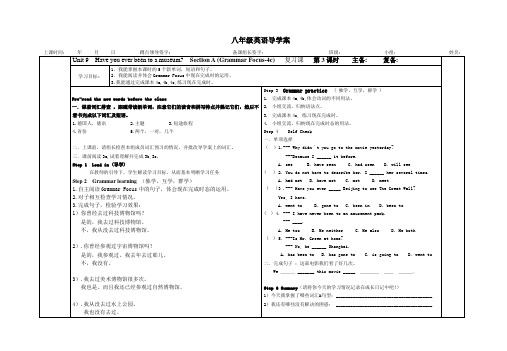
Step 3Grammarpractice( 独学,互学,群学 )
1.完成课本4a,4b,体会动词的不同用法。
2.小组交流,归纳语法点。
3.完成课本4c, 练习现在完成时。
4.小组交流,归纳现在完成时态的用法。
Step 4 Self Check
一.单项选择
()1.--- Why didnˊt you go to the movie yesterday?
---Because I ______ it before.
A. see B. have seen C. had seen D. will see
( ) 2.You do not have to describe her. I ______ her several times.
A. had met B. have met C. met D. meet
--- ____.
A. Me too B. Me neither C. Me also D. Me both
( ) 5. ---Is Mr. Green at home?
--- No, he ______Shanghai.
A. has been to B. has gone to C. is going to D. went to
二.完成句子 :这部电影我们看了好几次。
We ___ _______ this movie _____ ____ __ ___.
Step6Summary(请将你今天的学习情况记录在成长日记中吧!)
1)今天我掌握了哪些词汇&句型:________________________________________
2)我还有哪些没有解决的困惑: ________________________________________
2019-2020学年人教新目标英语八年级下册Unit9SectionA(1a-1c)教案

(五)总结回顾(用时5分钟)
今天的学习,我们了解了形容词比较级和最高级的基本概念、重要性和应用。同时,我们也通过实践活动和小组讨论加深了对这些知识点的理解。我希望大家能够掌握这些知识点,并在日常生活中灵活运用。最后,如果有任何疑问或不明白的地方,请随时向我提问。
此外,我也意识到在课堂教学中,对于学生的反馈需要更加及时和具体。在接下来的教学中,我会尽量在学生回答问题时给予及时的鼓励和指导,让他们知道自己的进步和需要改进的地方。
2. 1b部分:提供三个问题情境,让学生运用所学的形容词比较级和最高级进行问答练习,巩固知识点。
3. 1c部分:设置一个小组活动,让学生在小组内讨论并完成一个形容词比较级和最高级的练习,提高学生的实际运用能力。
二、核心素养目标
本节课的核心素养目标主要包括以下方面:
1.语言能力:通过学习形容词比较级和最高级,使学生能够熟练运用所学词汇描述人物、事物和场景,提高学生的英语表达能力。
2.教学难点
-不规则形容词比较级和最高级的记忆:学生往往对不规则变化的形容词比较级和最高级感到难以记忆,如“good”变为“better”和“best”,需要通过重复练习和记忆策略来突破。
-比较级和最高级的语境应用:学生在实际语境中可能难以决定何时使用比较级和最高级,特别是在涉及到三者或以上比较的复杂句子中。
-搭配使用的副词:学生需要了解并运用与比较级和最高级搭配的副词,如“a little”, “a lot”, “much”, “even”等,以增强语言表达的丰富性。
举例:
-形容词“big”的比较级是“bigger”,最高级是“biggest”。
人教版八年级下九单元sectionA 3a-3c

Unit 9 Have you ever been to a museum?Section A 3a-3c教学设计方案作品名称Unit9 Have you ever been to a museum?Section A 3a-3c所需课时1课时所属学科英语适用年级初中二年级对应教材□有√人教版新目标八年级下册覆盖范围□单元□课√□其他教材分析Section A是语言的基本内容,是语言的输入呈现阶段。
在进行完1a、1b和1c 的看、听、说环节后,围绕着博物馆话题进行了阅读训练。
在实施3a的教学中,要求学生结成小组互动完成,通过order! order! 游戏熟悉文章内容,提高逻辑理解能力。
3b是3a内容的巩固和练习,可由学生结对训练完成。
设计理念面向全体学生,在教师的引导下,通过多媒体设计各种图片帮助。
学生加深对所学语言的理解,激发学生用英语进行交流的热情,通过游戏竞赛等形式,充分调动学生的积极性,注重过程评价,促进学生发展。
形成一定的综合语言应用能力。
教学目标及教学重难点教学目标:1.知识目标:A.词汇:复习或新学有关词汇,如amusement park, computer museum,tea art performance, etc.B.句型:掌握有关现在完成时的相关句型。
Have you ever been to a museum?Yes, I have./ No, I haven’t.2.能力目标:培养学生阅读技巧和阅读能力,通过游戏培养学生的逻辑能力和整合文章的能力。
3.情感目标:学习内容及谈话的主题贴近学生的生活,激发学生学习英语的欲望和兴趣,开阔学生的眼界;另外也培养同学之间和睦相处,团结合作的团队精神。
教学重点:1、学习运用重点句型 Have you ever been to…?2、学习谈论如何描述博物馆相关内容教学难点:熟练掌握和灵活运用现在完成时来谈论某人是否曾经去过某地。
学习者特征分析八年级的学生在经过初中一年的学习习惯养成以后,已经初步具备自我分析问题,解决问题的能力。
初中英语人教版八年级下册Unit 9 Section A 3a-3c
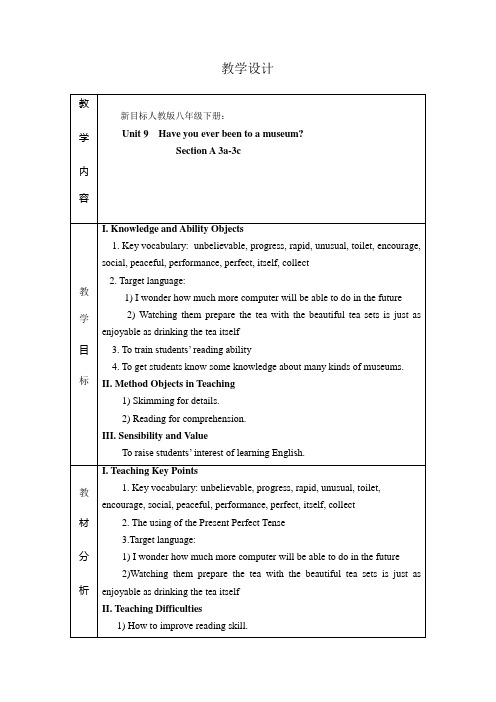
教学设计eaching aimsKnowledge aims:Ss can master new words and language chunksAbility aims:1.Ss can understand the passage.2.Ss practice reading and writing.Moral aims:Educate students to care about things around them.Teaching key points1.Be able to understand the passage.2.Learn to talk about things about them and learn to use “have/has been to…”Teaching difficulties:1.Learn to talk about things in their lives2.Learn to use “have/ has been to …”Teaching stepsStep 1, Warming upShow Ss a picture about a museum ,ask Ss to guess what kind of mesuem i t is.Step 2, Before reading1.Show Ss a picture of new words to consolidate the new word s.2.Show Ss three p ictures about 3a. Ask Ss to talk about every picture.Eg:T: What can you see in the first picture ?S1: I can see three computers.T: What do you think we will read in the passage ?S2: About a computer museum.T: Great ! What can we learn in a computer museum ?S3: The story of comput ers.S4: The usage of computers.S5: ….Step 3, While reading1.First reading1)Give Ss 1 or 2 minutes to ask them to read the passage quickly and answer the question.Which three museum do you think about ?2.Careful reading1)Read Para. 1 to answer the 2 questionsWhat do they have in the American Computer Museum?What’s the differences between the old computers and the new ones ?2)Read Para 2 to answer the 2 questionsWhat did Amy see in the International Museum of Toilets in India ?What does the International Museum of Toilets encourage people to do ?3)Read Para.3 to answer the following questionsWhat do the tea art performances show?Why does LinLin’s grandpa love collecting tea sets ?4)Read the article again and answer the following questions (3b).What does Ken say about the American Computer Museum?What can we learn at the International Museum of Toilets?Why is the Hangzhou National Tea Museum a nice place to enjoy tea ?5)Read the passage and find out the difficult points. Disc uss them in groups.7) Share the whole story with students according to the chart.8) Retell the story according to the charts.Step4, After readingAsk Ss to finish 3c by themselves , then check the answers. Step5, HomeworkSearch other museums and try to write a report.附件:个人研修计划模板。
人教新目标英语八年级下册Unit9SectionA3a---3c教案

⼈教新⽬标英语⼋年级下册Unit9SectionA3a---3c教案Unit 9 Have you ever been to a museum?单元教学⽬标教材分析:本单元的核⼼语⾔项⽬是“Talk about past experiences”,围绕“有趣的地⽅”为话题展开的教学活动。
继第⼋单元学习现在完成时后,继续学习“been, ever, never”在现在完成时中的⽤法。
因此,本单元起着温故⽽知新的作⽤。
学⽣要掌握谈论过去经历的基本句型,学会⽤现在完成时介绍⾃⼰游览过的地⽅,询问他⼈曾经去过的名胜并学习为某地写宣传⼴告。
知识⽬标:1)交际话题:谈论过去的经历、有趣的地⽅、异国风情。
2)词汇:1、掌握⼀些表达感受的形容词:unbelievable, unusual, peaceful, perfect等;2、学习been, ever 和 never的⽤法。
3、学会运⽤本单元⽣词表中的⿊体词汇。
3)短语:掌握⼏个“有趣地⽅”的短语:amusement park, National Science Museum, International Museum of Toilets, Hangzhou National Tea Museum, Disneyland, the Terracotta Army, the Bird’s Nest.4)句型:能熟练运⽤下列句型谈论过去的经历:--- Have you ever been to …? ---Yes, I have./ No, I haven’t.--- I have ever been to…. --- Me, too.--- I have never been to …. --- Me, neither.5) 语法:学习been, ever, never在现在完成时中的⽤法。
能⼒⽬标1.学习⽤现在完成时介绍⾃⼰并询问他⼈去过的地⽅。
2.学会为故乡或去过的地⽅写宣传⼴告。
2019-2020学年人教新目标英语八年级下册Unit9SectionA(3a-3c)教案

四、教学流程
(一)导入新课(用时5分钟)
同学们,今天我们将要学习的是《Unit9 SectionA(3a-3c)》这一章节。在开始之前,我想先问大家一个问题:“你们在旅行中有没有遇到过难忘的事情?”这个问题与我们将要学习的内容密切相关。通过这个问题,我希望能够引起大家的兴趣和好奇心,让我们一同探索如何用英语描述过去的旅行经历。
-难点二:在描述复杂事件时,学生可能难以将多个动作按照时间顺序和逻辑关系串联起来,如:“First, we visited the Forbidden City, then we went to Tiananmen Square, and at last we had dinner in a restaurant.”
-学生能够用过去完成时描述在过去某个时间点之前已经完成的动作,如:“By the time you called me, I had finished my homework.”
2.教学难点
(1)区分并正确使用过去进行时和过去完成时;
(2)在口语和写作中灵活运用过去时态描述复杂事件;
(3)记忆和使用本节课的重点词汇和短语;
3.成果分享:每个小组将选择一名代表来分享他们的讨论成果。这些成果将被记录在黑板上或投影仪上,以便全班都能看到。
(五)总结回顾(用时5分钟)
今天的学习,我们了解了过去时态的基本概念、重要性和应用。通过实践活动和小组讨论,我们也加深了对过去时态的理解。我希望大家能够掌握这些知识点,并在日常交流中灵活运用。最后,如果有任何疑问或不明白的地方,请随时向我提问。
人教版八年级下册英语Unit9 Section A 3a--3c 课件2
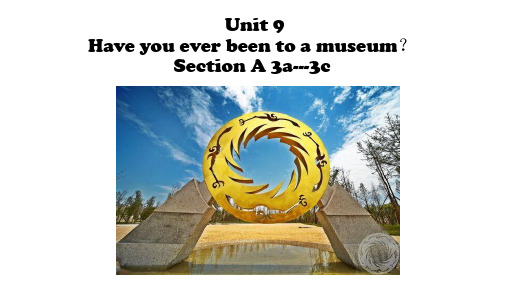
Three students talk about the most interesting museums they have 3a ever been to. Read the magazine article and answer the questions.
What can you see in the picture? What do you think we will read about these interesting museums in
the magazine article?
Scanning Tip: Pay attention to the words with capital letters.
1. Who are talking about the museums? 2. Which three museums do the students talk about?
Museum of Toilets. 4. It also encourages government and social groups to think about ways to
improve toilets in the future. 5. It’s a relaxing and peaceful place near a lake.
improve progressed
unusual
peaceful invented rapid
1. They have information about different computers and who invented them. 2. It’s unbelievable that technology has progressed in such a rapid way! 3. I’ve recently been to a very unusual museum in India, the International
2020春人教版八年级英语下册教案:Unit9SectionA(3a-4c)

(三)实践活动(用时10分钟)
1.分组讨论:学生们将分成若干小组,每组讨论一个与一般过去时相关的实际问题,如分享自己的周末活动。
2.实验操作:为了加深理解,我们将进行一个简单的角色扮演活动。这个活动将演示如何在实际对话中使用一般过去时。
(3)听力理解:对于听力部分,学生可能难以在短时间内捕捉到关键信息。教师需要引导学生进行预听、边听边记等策略,提高听力理解能力。
(4)口头表达:学生在口头描述过去事件时,可能会出现语序混乱、动词时态错误等问题。教师应鼓励学生多进行口头练习,并提供及时反馈,帮助他们改正错误。
举例说明:
在讲解一般过去时态时,教师可以通过以下例子进行讲解和强调:
在实践活动方面,学生们在分组讨论和角色扮演活动中表现出很高的积极性。他们能够将所学知识应用到实际情境中,这让我感到非常欣慰。但同时,我也发现部分学生在口头表达时,句子结构和动词时态仍然存在问题。针对这一点,我会在课后加强个别辅导,帮助他们巩固知识点。
在学生小组讨论环节,我鼓励学生们提出自己的观点和想法,并进行交流。这种互动式的学习方式有助于提高他们的思维品质和沟通能力。但我也注意到,有些学生在讨论过程中过于依赖课本,缺乏自己的思考。因此,我计划在今后的教学中,引导学生多关注生活实际,学会从生活中发现和提炼问题。
3.成果分享:每个小组将选择一名代表来分享他们的讨论成果。这些成果将被记录在黑板上或投影仪上,以便全班都一般过去时的基本概念、重要性和应用。同时,我们也通过实践活动和小组讨论加深了对一般过去时的理解。我希望大家能够掌握这些知识点,并在日常生活中灵活运用。最后,如果有任何疑问或不明白的地方,请随时向我提问。
新目标八年级英语下Unit9_SectionA 3a

言外之意他对香港有所了解)
2. 现在完成时动词可以表示开始于过去持续 到现在(也许还会继续进行下去)的动作或状态。 1) I have studied English since last year. 我从去年开始学习英语。 2) She has lived in Beijing for five years. 她住在北京已经五年了。 注意: come, go , leave, arrive, buy, lose, receive, join, die, bury 和marry 等动词所表示的动作是 一时的, 不能延续的, 故不能与for …, since … 等开头的表示一段时间的状语连用。不过, 这些 词用于否定句则可以与表示持续的时间状语连用, 即动作的不发生是可以持续的。
1955, the 1st one, Los Angeles
1971, the 2nd one, Florida
1982, 3rd one, Tokyo
1992, the 4th one, Paris
2004, the latest one, Hong Kong
This is the gate of Disneyland! -Have you ever been to …? -Yes, I have. I have been to…./ No, I haven‟t./ Never.
非延续性动词与延续性动词间的转换
leave→ borrow→ buy→ begin/start→ die→ finish→ come/become/go→ join→ be away keep have be on be dead be over be be in/be a member of
人教版英语八年级下册《Unit 9 Section A3a 阅读》导学案(含答案)
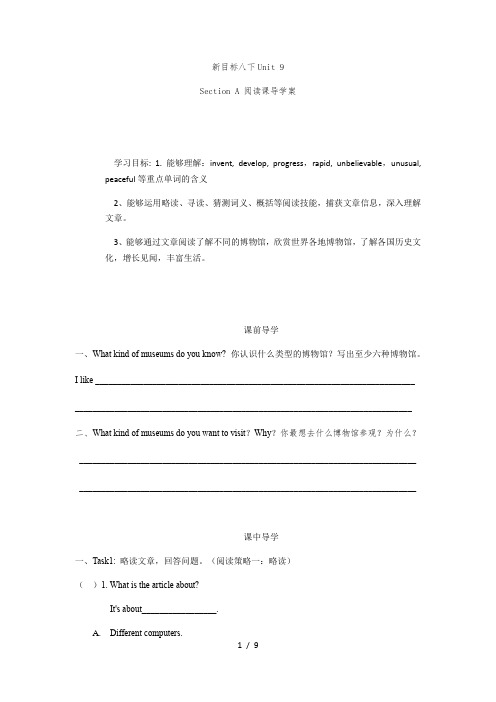
新目标八下Unit 9Section A 阅读课导学案学习目标: 1. 能够理解:invent, develop, progress,rapid, unbelievable,unusual, peaceful等重点单词的含义2、能够运用略读、寻读、猜测词义、概括等阅读技能,捕获文章信息,深入理解文章。
3、能够通过文章阅读了解不同的博物馆,欣赏世界各地博物馆,了解各国历史文化,增长见闻,丰富生活。
课前导学一、What kind of museums do you know? 你认识什么类型的博物馆?写出至少六种博物馆。
I like _________________________________________________________________________ _____________________________________________________________________________ 二、What kind of museums do you want to visit?Why?你最想去什么博物馆参观?为什么?_____________________________________________________________________________ _____________________________________________________________________________课中导学一、Task1: 略读文章,回答问题。
(阅读策略一:略读)()1. What is the article about?It's about_________________.A.Different computers.B.Different toilets.C.Different tea sets.D.Different museums.二、Task2: 看图预测。
人教版八年级下册Unit 9 Section A 3a- 3c 课件
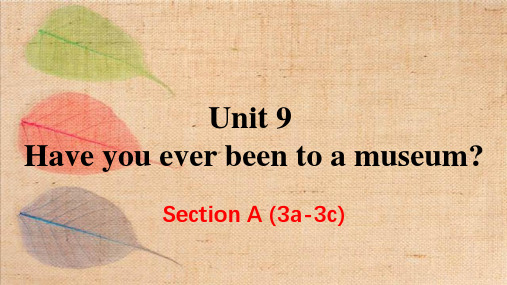
Me _n_e_it_h_e_r_.
water park
Pairwork
A: Have you ever been to …? B: Yes, I have./ No, I haven’t. A: How about you? B: Me too./ Me neither.
A: Have you ever been to …?
5. —These farmers have been to the
United States.
—Really? When _B__ there?
A. will they go B. did they go
C. do they go D. have they gone
Homework.
1. Write a short report about a museum you have been to. 2. Draw your dream museum. 3. Look for information about museums.
2)They have information about a.___________d_i_ff_e_r_e_n_t_computers b.___________w__h_o_i_n_v_e_nted them
3)Technology has progressed in such a rapid way:
thetPhaelaGcereMatuWseaulml
the Shaolin Temple
Guilin
Shanghai
Hainan
(采访你的同桌)
Have you ever been to…? Yes, I have./I have ever been to… No, I haven’t./I have never been to…
(新)人教新目标八下 Unit 9 Section A(3a)课件(精品)

一般过去时的时间状语有:yesterday, last week, … ago, in 1980, in October, just now …
共同的时间状语有:this morning, tonight, this summer, before, already, …
现在完成时的时间状语有:for, since, ever, never, just, already, yet, in past years …
2. What does Ken say about the American Computer Museum? It’s unbelievable that technology has progressed in such a rapid way.
3. What can we learn at the International Museum of Toilets? We can learn the history and development of toilets.
I saw the film last month. 我上个月看了这部电影。 (只说明上星期看了这部电影,不 涉及现在的情况)
① 一般过去时只强调过去的动作;现在完成时强调过去 的事情对现在的影响。 ② 一般过去时通常与表示过去的时间状语连用;现在完 成时那么不能与表示过去的时间状语连用。 ③ 一般过去时单纯表示过去的经历;现在完成时表示过 去的动作或状态延续到现在并可能持续下去。
I haven’t ever spoken to her. 我未曾和她说过话。
never意为“从来没有〞,常与before连用,多放在助 动词与过去分词之间。
e.g. I have never travelled by plane before. 我以前从来没有乘飞机旅行过。
- 1、下载文档前请自行甄别文档内容的完整性,平台不提供额外的编辑、内容补充、找答案等附加服务。
- 2、"仅部分预览"的文档,不可在线预览部分如存在完整性等问题,可反馈申请退款(可完整预览的文档不适用该条件!)。
- 3、如文档侵犯您的权益,请联系客服反馈,我们会尽快为您处理(人工客服工作时间:9:00-18:30)。
___________________________________________________________
2. It is unbelievable that technology has progressed in such a rapid way.
5. A:(on the phone)Can I speak to Mary, please?
B:She’s out, I’m afraid. She ________ to the cinema this evening.
六、合作探究
Note :延续性的动词与非延续性的动词:come , go , leave , buy , join , become , begin , open , finish , get up ,等词叫做非延续性的动词。非延续性的动词用于现在完成时肯定句中时,不能与时间状语连用,但将它们转换为延续性的动词时便可以与时间状语连用。
4. I have never _____________(argue) with my parents.
5. I ____________(go) to the space museum last year.
6. Harvey____________(have) a great time at the Water World.
Lucy hasbeen away fromhome since ten year ago.
4. Iboughtthe dictionary two days ago.
I havehadthe dictionary since two days ago.
非延续性的动词用于现在完成时否定句中,可以与一段时间连用。
My parents _______ ______ back ____.
2.The boys have been to Japan lots of times. (改为一般疑问句)
_______ the boys _______ to Japan lots of times?
3.Has your sister gone to the bookstore? (作肯定回答)
二、自学检测
所给词的适当形式填空
1. Have you ever _____________(study) with more than three friends?
2. Has Tom ever _____________(travel) to China?
3. Have you ever________(say) something you didn’t want to say?
_______, she _______.
4.I have been to the theme parkthreetimes. (对划线部分提问)
_____ ______ times have you been to the theme park?
5.The movie has been onfor half an hour. (对划线部分提问)
编
号
2
班 级
姓 名
侏儒中学课堂讲学稿
八年级英语科下册《Unit 9 Section A 3a-Section B1d》
课型:NEW编写人:审核人:时间:
【课题】Unit9 Have you ever been to an amusement park?
【学习目标】
1、了解国外的风情和文化。
2、现在完成时的运用。
5. Wehaven’t seeneach other for ten years.
=It isten yearssincewemetlast time.
七、重点突破
1. It is really interesting, isn’t it?它很有趣,不是吗?
本句是一个反意疑问句。反意疑问句的特点就是“前否后肯,前肯后否”,而且附加疑问句的动词在时态,人称或者数等方面与陈述部分的动词相呼应。
从吃早饭到现在我写了六封信。
I have been writing letters since breakfast.
从吃早饭到现在我一直在写信。
b. I have read this book.我读过这本书。
I have been reading this book.我一直在读这本书。
八、课后巩固
(一)单项选择
— Since she ______ (get) a new job here.
3. How many words _____ you ______________ (learn) since two years ago? 4. My mother ____ never ________ (hear) of this man.
_____ _______ has the movie been on?
(三)根据括号中所给动词的提示完成下列句子或对话。
1. I ____________________ (work) in this city for 7 years.
2. — How long ______ she ______ (live) here?
科技以如此迅速的方式发展真让人难以置信。
1) unbelievable是形容词,意为:“难以置信的”
2)progress是动词,是:“进步;进展”
作为名词时是不可数名词:make progress“取得进步”
3. It also encourages governments and social groups to think about ways to improve toilets in the future.
2. A:Sally and Tim are on holiday, aren’t they? Where ____they _______?
B:To Florida, again.
A:How many times _______they ______ there?
B:This is their third visit.
1. Peter hasbecomea policeman.
Peter hasbeena policeman for 3 years.
2. The film hasbegun.
The film hasbeen onfor half an hour.
3. Lucylefthome ten years ago.
You don’t like classic music, பைடு நூலகம்o you?你不喜欢古典音乐,对吗?
Yes, I do.不,我喜欢。No, I don’t.是的,我不喜欢。
翻译:她几乎不去游泳,对吗?
__________________________________________________________
3. A:Can I have an apple, please?
B:We haven’t got any. I_________ not ________ to the shops today.
4. A:Where’s Tony?
B:He’s got a headache so he _________to bed.
3. Tony, with his friends,________ been to the Water World.
A. have B. has C. is D. are
4. He’s never been to the museum, ________ Lily.
A. so is B. so has C. neither is D. neither has
5.一般过去时,现在完成进行时和现在完成时的区别
一般过去时只表示过去的一个动作或状态,和现在不发生联系。现在完成时是用一个过去的动作说明现在的情况。
He lived in Beijing in 2000.
只说明他2000年住在北京,他目前住在哪里并不清楚。
He has lived in Beijing since 2000.
1. They have been to New York City ________。
A. ago B. two years ago C. before D. once ago
2. Tina has ________ been to the library, so she knows nothing about it . A. never B. no C. ever D. once
Tom doesn’t like this one. Neither do I.
So用于肯定句后表示“也同样”,so后要倒装
He is a teacher. So am I.
You will go to the aquarium. So will I.
Tom likes swimming. So do I.
它还鼓励政府和社会团体为改善将来的厕所想办法。
encourage sb. to do sth.鼓励某人做某事
4. neither和so的用法
Neither用于否定句后表示“也不”,neither后要倒装
He is not a doctor. Neither am I.
You will not go to the water park. Neither will I.
四、合作探究
1.朗读3a中的短文。
2.仔细阅读3a中的信息,理解意思3b、3c。
五、选择填空(have / has been 或have/has gone)
